Navigating the past is your forte, but now it's time to voyage into your future with an outstanding historian resume. We've gathered up all the best tips, examples, and templates to make your historian resume shine brighter than the lost city of Atlantis.
Keep reading to learn all about:
- Choosing between a standard resume and a cv as a historian
- Writing an eye-catching and effective resume summary
- Including a range of key historian skills on your resume
- Describing your work experience as a historian in a compelling way
- Accurately listing your educational credentials as a historian
- Accessing top resources for job-seeking historians
Still looking for a job? These 100+ resources will tell you everything you need to get hired fast.
1. Choose the right historian resume format
As a historian, there are many different pathways to go down professionally. For some historians, the path of academics and research may be their ideal route, while others may desire a more hands-on and explorative career.
The type of historian you choose to be matters when it comes to picking a resume format. If you are applying to a more active role, such as an archaeologist or curator, you will generally want to use a standard resume format, such as the reverse-chronological or functional resumes.
However, if you are working as a historian in the field of academia, you will likely need to use a Curriculum Vitae, or CV. A CV is a longer form resume with multiple pages covering the entirety of your academic and professional career. It will also include extra sections like awards, publications, and professional associations.
Here is a quick breakdown of each of these formats and when to use them:
- Reverse-Chronological: The standard resume format expected by most employers that focuses primarily on work experience. This format is well suited for historians in active roles who have at least 2 to 3 solid years of experience working in the field.
- Functional: The functional resume format focuses on education, skills, and unpaid experience instead of work experience. This format is often used by entry-level applicants who have either recently earned or are in the progress of completing an Associate's or Bachelor’s degree.
- Curriculum Vitae: A multi-page resume format that is most often used by high-level academic professionals, such as professors or university administration. Generally, an applicant using a CV format will have either a Master’s degree or a Ph.D.
Choose your preferred template and make your resume shine.
2. Write an eye-catching and effective resume summary
A resume summary is a brief statement that helps introduce the applicant to the employer. Think of your summary like a narrative hook – it should contain eye-catching details that grab the employer’s attention and compel them to read further.
To help illustrate how to write an effective resume summary, here is a weak example followed by a correction and explanation.
Incorrect historian professional profile example
Recently-graduated Historian with several years of academic research experience. Specialized in art history, specifically in analyzing documents and paintings. Assisted the university museum in the acquisition of several new artifacts.
Why is this Incorrect?
In this example, it is clear that the applicant is a recent graduate and is trying to frame their academic experience in a way that mimics work experience. While this has the potential to be effective, the applicant needs to provide more exact details to help impress the employer, especially since they are showcasing their academic work over formal work experience.
Corrected historian professional summary example
Passionate Art Historian with 3+ years of experience working as an academic research assistant at Duke University. Key responsibilities included analyzing historical documents and paintings from the Baroque period for authenticity and properly storing, preserving, and displaying these artifacts. Assisted the university’s museum curator in the acquisition of 14 new historical paintings, including a Vivaldi.
Why is this Correct?
In this corrected example, the applicant does an excellent job of making the most of their academic experience. They show clear knowledge of art history and how to handle fragile artifacts, as well as showing their interpersonal abilties through describing how they assisted a museum curator.
3. Include a range of key historian skills on your resume
As you write your historian's resume, it is crucial to include both technical and interpersonal skills to show employers you understand the advantage of having a wide range of abilities.
Technical skills are your learned abilities gained through training and education. Comparatively, interpersonal skills can be both inherent and learned, dealing with how you work with people and handle your emotions.
Here are 10 examples of both technical and interpersonal skills for historians to consider including on your resume:
The best historian technical skills to put on your CV
- Gathering historical data
- Analyzing historical data
- Tracing historical developments
- Authenticating artifacts
- Restoration procedures
- Conducting formal research
- Archiving documents and artifacts
- Preserving historical materials
- Evaluating new findings
- Training junior historians
Effective interpersonal skills for your historian resume
- Attention to detail
- Patience
- Verbal and written communication
- Problem-solving
- Critical thinking
- Collaboration
- Comprehension
- Determination
- Contextualization
- Active listening
4. Describe your work experience as a historian in a compelling way
Describing your work as a historian can be difficult to write compellingly – especially if the majority of your work centers around reading and research.
However, you can overcome this challenge by focusing on your key accomplishments in your work experience section. By doing so, you can show employers not just your experience and skills but how you apply both of these in the field.
Here is an example of a work experience entry from a historian resume
Smithsonian Institution, Washington D.C.
Artifact Historian
July 2017 to February 2020
- Led the acquisition of 25 new historical artifacts from the Classical era, assisting in the creation of a brand new exhibit.
- Performed restorative care to artifacts with culturally appropriate and historically accurate materials.
- Analyzed historical information and documentation to verify the authenticity of over 300 different artifacts throughout the duration of this position.
5. Accurately list your educational credentials as a historian
In general, a professional historian will have a minimum of a master’s degree that reflects their area of concentration and study.
However, some historians may hold only a bachelor’s degree or may hold higher degrees like a Ph.D. It ultimately depends on the employer and what level of education and expertise they are looking for. Regardless of which educational credentials you have, you should always include:
- The formal title of your degree
- The name of your school or university
- Your date of graduation
- Notable academic accomplishments (honors, awards, etc.)
Here is an example of a well-crafted education section on a historian resume
Education
Middle Tennessee State University, Murfreesboro, TN
M.A. in History
- Graduated: 2018, Summa Cum Laude
- Research Assistant for Dr. Henry Longsworth, Professor of U.S. History
- Publications: Contributed findings in 3 chapters in a historical textbook on American history to be distributed to public high schools.
Appalachian State University, Boone, NC
B.A. in History
- Graduated: 2014, Summa Cum Laude
- Recognized in Dean’s List 2012, 2013, 2014
- Honors Program Member
6. Top resources for job-seeking historians
Uncover the best historical career opportunities with these first-rate job search resources tailored specifically for historians:
- Professional organizations: Check out websites of organizations like American Historical Association (AHA) or National Council on Public History. These often have job boards and are great places for networking.
- Academic job boards: Websites like HigherEdJobs and ChronicleVitae often list a variety of historian roles in educational settings.
- Museum websites: Cultural institutions like museums or libraries often post job openings directly on their websites.
- General job boards: Don't overlook broader platforms like Indeed, LinkedIn, or Glassdoor, which have a variety of listings in the history field.
- Social media networks: Platforms such as LinkedIn and X can be useful for networking and discovering job opportunities. Following hashtags like #Twitterstorians, #PublicHistory, or #MuseumJobs could lead you to potential openings.
- Historical publications: History magazines or journals often advertise history-related jobs. Examples include Perspectives on History or The Public Historian.
Remember, while hunting for the perfect role, your historian resume will be your greatest tool, make it count!
Historian Resume FAQ
How do I highlight my research skills on a historian resume?
Within your 'Skills' section, emphasise your research abilities. Use specific examples, if possible, like mastery in archival research or expertise in using digital research tools. Additionally, in the 'Work Experience' section, outline your duties and achievements that underscore your research skills. Use numbers for impact, if possible, like 'Conducted extensive research using 20+ online databases and archives'.
How should I format my historian resume?
Most historians prefer the reverse-chronological format as it puts the spotlight on your work experience. It lists your latest work history first and moves backward in time, highlighting your career progression.*
Should my historian resume include a list of publications or presentations?
Yes, if you have been published or given professional presentations, include them! This can demonstrate your expertise and commitment to historical research and education.
How can I make my historian resume stand out?
To make your historian resume stand out, employ industry-relevant keywords, quantify achievements where possible (e.g., 'Led a team of five on a research project which resulted in a published paper'), and maintain a clean, professional layout.
I'm a recent graduate with no job experience. Can I still write a strong historian resume?
Absolutely! Highlight relevant coursework, any internships or related volunteer work. Also, discuss significant research projects or papers from your studies showcasing your skills as a historian.

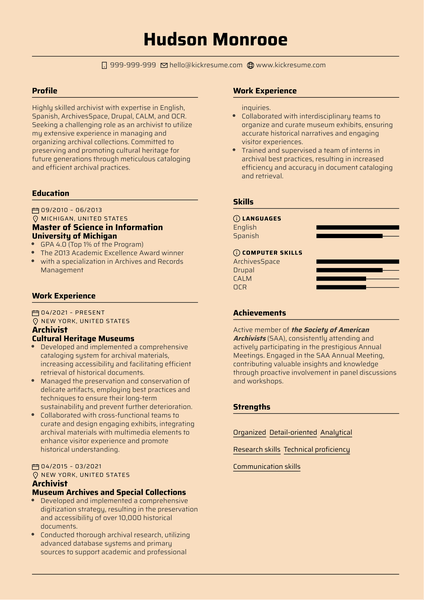
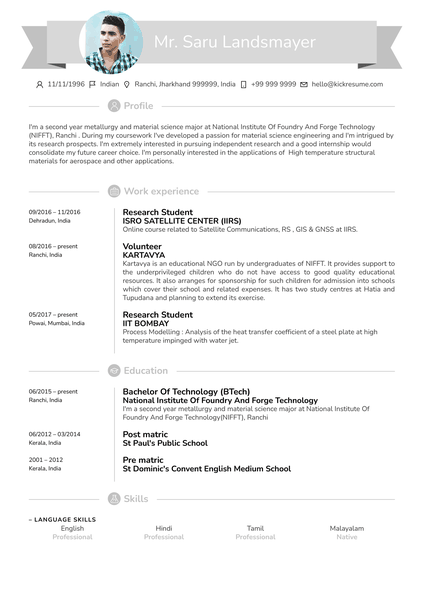
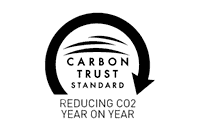

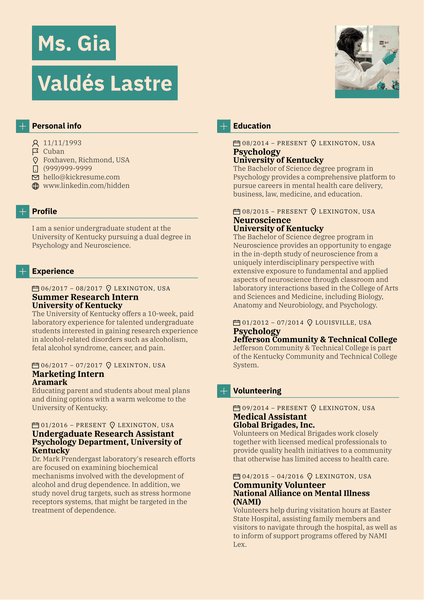

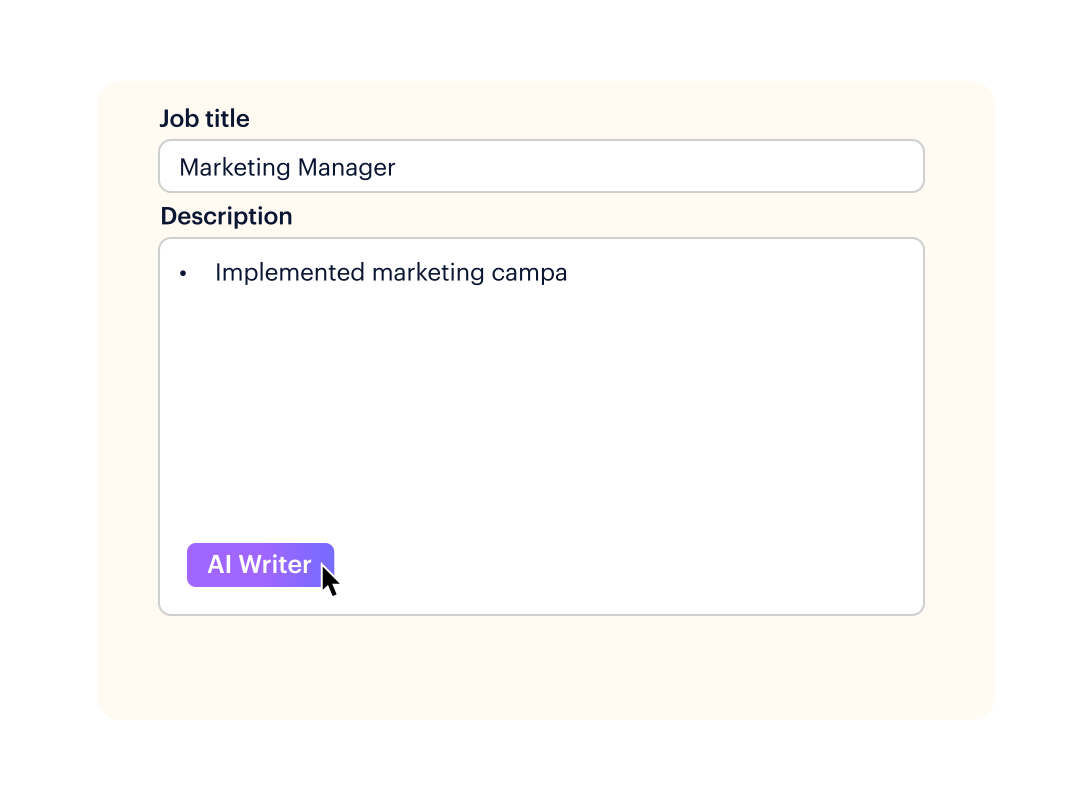


![How to Write a Professional Resume Summary? [+Examples]](https://d2xe0iugdha6pz.cloudfront.net/article-small-images/i-Profile.svg)
![How to Put Your Education on a Resume? [+Examples]](https://d2xe0iugdha6pz.cloudfront.net/article-small-images/i-Collage-Universities.svg)
![How to Describe Your Work Experience on a Resume? [+Examples]](https://d2xe0iugdha6pz.cloudfront.net/article-small-images/Experience.svg)


